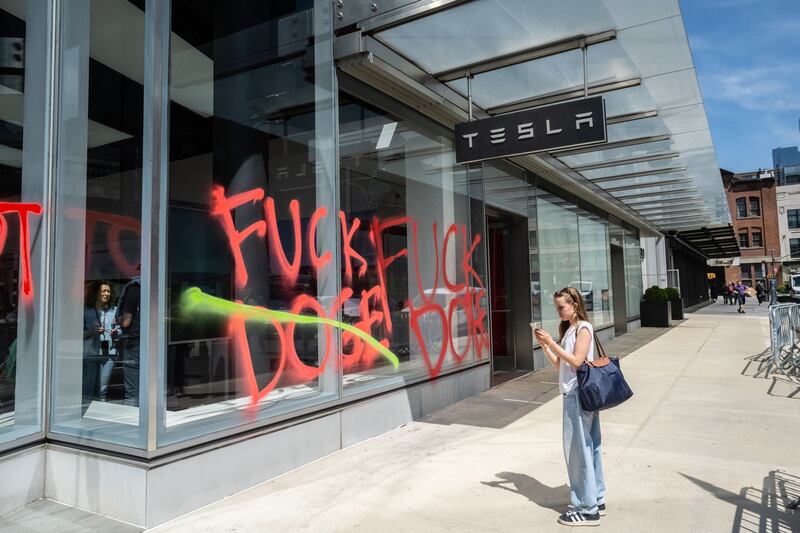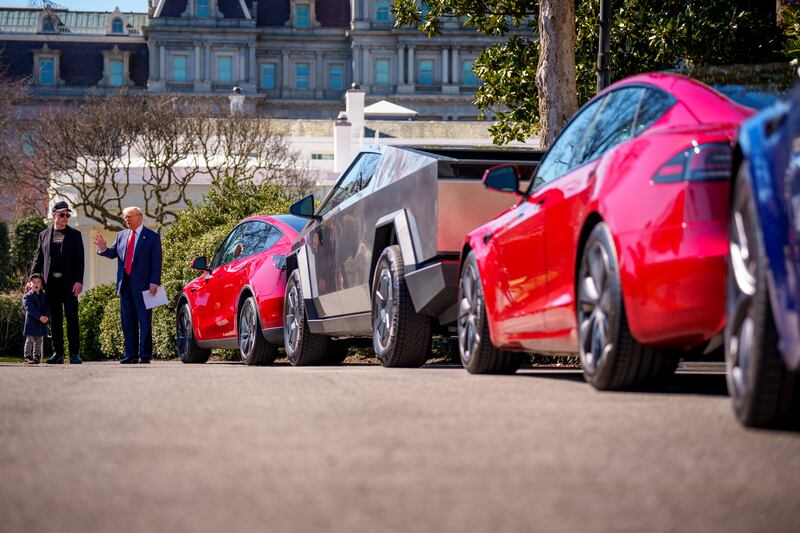Over the weekend, I was in Richmond, Virginia at a soccer tournament. On Saturday afternoon, I parked my Tesla Model 3 in the lot at the River City Sports Plex. I watched my son’s game. And when we got back to the car, I found this taped to the bumper:

I obviously knew that Tesla—and its founder Elon Musk—had become increasingly divisive in the last few years, but the sticker surprised me.
It got me to thinking—you do a lot of that when you are making the two-hour drive to and from Richmond multiple times in a weekend!—about me, Tesla and the politicization of just about everything.
Let’s start with me and Tesla. I bought my car in 2019 or 2020. At that time, owning a Tesla was seen as a reaction against MAGA America. My biggest worry when I bought the car—other than it running out of battery, of course—was some bro keying it or spray-painting it or setting fire to a charging station.
Less violently, there was a whole movement where people would park their big internal combustion engine trucks in spots designated for electric cars as a form of protest.
Which I thought was dumb. Because, candidly, I didn’t buy a Tesla to send a message to people who like the internal combustion engine. Or even people who roll their eyes at the environmental benefits of an EV.
I didn’t buy it to send any message at all! I bought it because it looked cool. Because it was really fun to drive. And I liked the idea that Tesla was constantly updating the car’s software; it felt futuristic.
Fast forward to that parking lot in Richmond over the weekend. Just like my Tesla wasn’t a sign of me supporting the tree-hugging EV movement in 2019, it also isn’t a symbol of my support for Elon Musk’s role in the Trump administration in 2025.


To me, the vandalism speaks to the idiocy of trying to make everything political. Five or six years ago, my Tesla symbolized everything MAGA world hated. But now it symbolizes everything the left hates?
Doesn’t that suggest that there’s an inherent ephemeralness to what an inanimate object “means” in a political context? If the meaning of owning a certain kind of car can change 180 degrees in the space of a single administration, give or take, isn’t it possible that ascribing meaning to it in the first place was misguided?
One more example: Anytime I post about going to eat at Chick-Fil-A, I get a few comments of this sort: How does HATE taste????
This is in reference to the fact that Chick-Fil-A was founded by an evangelical family who, in the past, have made public statements opposed to gay marriage and who have donated to causes viewed as anti-LGBT.
(It’s worth noting that in 2019, Chick-Fil-A announced it would cease donating to any organizations that were historically anti-LGBT rights.)
But does a sandwich have to be political? I didn’t eat it because I wanted to send a message to gay people. I ate it because it was delicious. I know there are plenty of people out there who will argue some version of this: By eating the sandwich or buying the Tesla, you are lining the pockets of people with views that should be rejected. You are—in the parlance of the times—“normalizing” them and their views.
To this I would say two things:
- I am pretty sure Elon Musk and Chick-Fil-A are going to be just fine whether or not I own a Tesla or buy a #1 meal.
- If your bar is that you never interact with or buy anything from a company whose founder has taken a position with which you disagree or which has donated to a cause you don’t support, I find it very hard to believe you are going to make any purchases ever. Breaking news: Giant corporations tend to do what makes them the most money, not always what’s “right.”
Not everything has to be political. You can buy a car because it’s fun to drive without sending some deep signal about where you stand in politics. You can eat a sandwich because it’s delicious, not because you have an anti-gay agenda.
The obsession with making every little bit of our lives into a political statement is, I think, making us all crazy. And driving us further from any sort of recognition of our common humanity.
Want more ball and strike calling—no matter what uniform the batter at the plate is wearing? Check out Chris Cillizza’s Substack and YouTube channel.
The post Opinion: Please Leave My Tesla Alone—It’s Not a Political Statement appeared first on The Daily Beast.




